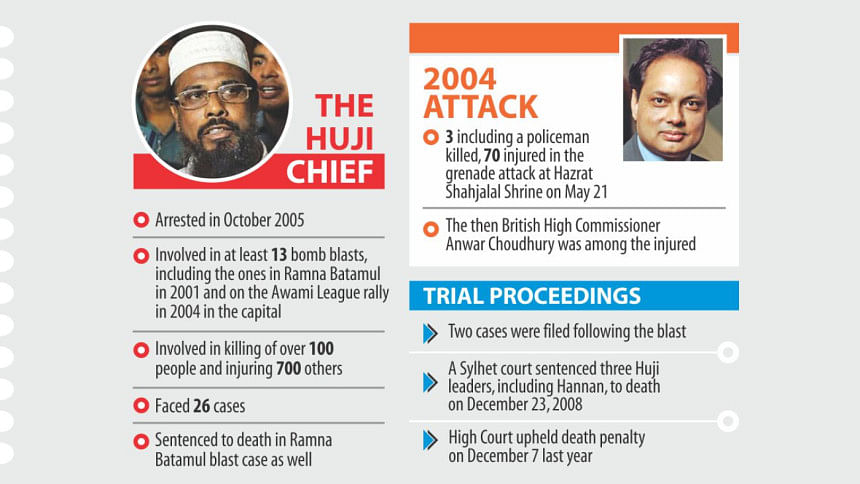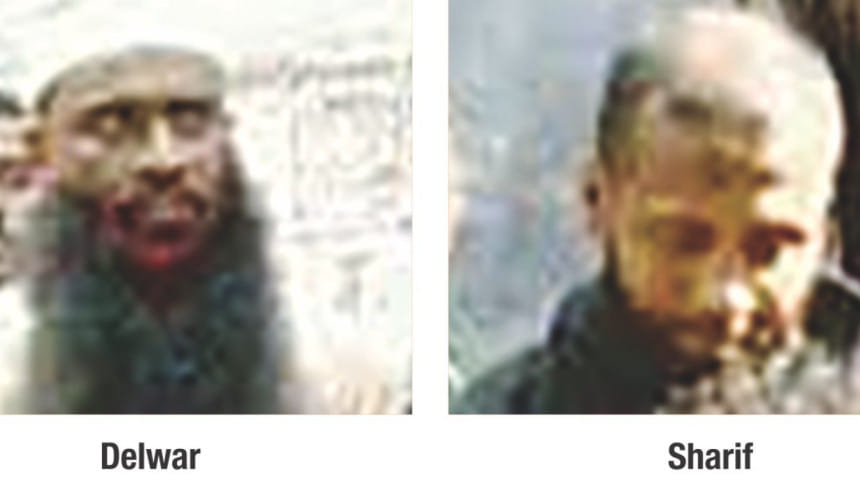Huji kingpin Mufti Hannan hanged

Mufti Abdul Hannan, one of the country's most dreaded militants, was involved in plotting and carrying out all the terror attacks by Harkat-ul-Jihad al-Islami Bangladesh.
The Huji chief was responsible for the killing of more than a hundred people in 13 militant attacks between 1999 and 2005.
The families of the victims can now heave a sigh of relief as the notorious militant walked the gallows last night along with his two cohorts -- Sharif Shahedul Alam Bipul and Delwar Hossain alias Ripon -- for carrying out a grenade attack on the then British high commissioner Anwar Choudhury in Sylhet on May 21, 2004.
Anwar, the prime target of the attack at Hazrat Shahjalal Shrine, was wounded, and two bystanders and a policeman were killed.
Hannan was also a death-row convict in the case over the 2001 Ramna Batamul blast at a Pahela Baishakh programme.
“Hannan and Sharif were hanged at Kashimpur High Security Prison [in Gazipur] and Delwar at Sylhet Central Jail at 10:00pm,” Brig Gen Syed Iftekhar Uddin, inspector general of prisons, told The Daily Star.
This is the first execution of a high-profile militant like Hannan in a decade.

Earlier on March 29, 2007, six top militant leaders, including Jama'atul Mujahideen Bangladesh supremo Abdur Rahman and his deputy Bangla Bhai, were executed for killing two Jhalakathi judges.
On December 23, 2008, a Sylhet court sentenced Hannan and his two accomplices to death. The High Court upheld the lower court verdict on December 7 last year.
Later, the Supreme Court confirmed the death penalty for the three.
In a span of five years from 1999, Huji militants led by Hannan carried out terror attacks with a mission to introduce Sharia law and annihilate what they said was “the enemy of Islam.”
In the first such attack, they killed 10 people at a cultural function of Udichi in Jessore on March 6, 1999.
Under Hannan's leadership, Huji attempted to assassinate Awami League President Sheikh Hasina, the then leader of the opposition in parliament, on August 21, 2004 by carrying out a grenade attack on an AL rally on Bangabandhu Avenue in the capital. Twenty-four party leaders and activists were killed in the attack.
LAST MOMENTS
The jail authorities started preparations for executing the three after the president rejected their mercy petitions on Sunday.
Yesterday evening, the authorities beefed up security in and around the Kashimpur jail. Nearby roads were made off limits to pedestrians and vehicles for around eight hours from 3:30pm. Business establishments within 500 yards of the prison were asked to keep their shutters down.
Two ambulances entered the jail around 6:30pm.
Following execution, Hannan's body was taken to his village home in Gopalganj's Kotalipara and Sharif's body to Chandpur's Masdi village for burial.
Earlier, Hannan's wife, two daughters and three brothers met him at the jail. His mother couldn't make it to the prison due to illness.
His elder brother Aliuzzaman told The Daily Star that Hannan called him on his mobile phone from the jail around 8:30pm, and talked to their mother for a minute.
Sharif's family members also went to the prison to meet him in the morning.
At Sylhet Central Jail, Delwar's family members met him around 2:00pm.
Guarded by three police vans, an ambulance carrying Delwar's body left the prison at 10:40pm for his village home in Moulvibazar's Konagaon, Senior Jail Superintendent Sagir Miah told reporters.
As per the jail code, the jail authorities can execute death sentence between 21 and 28 days from the date of issuance of death warrants.
The Sylhet Divisional Speedy Trial Tribunal issued death warrants for the three on March 22.
POLITICAL BLESSING
Hannan and his men were used as mercenaries to carry out the August 21 grenade attack, according to the charge sheet of the case.
They agreed to execute the plot to assassinate Hasina and other top AL leaders on assurance that they would be provided safety and allowed to continue their activities unhindered after completion of the task.
The attack was the outcome of a collaboration between Huji men, influential leaders of the BNP and the Jamaat-e-Islami, and some officials of the home ministry, police, Directorate General of Forces Intelligence, National Security Intelligence and Prime Minister's Office, said the charge sheet.
Those who had engaged Hannan and other militants for the killing mission were true to their promises. Following the attack, they started delivering on their assurance of shielding Hannan and other militants from legal action. They had cooked up a story involving Joj Mia, a petty criminal who was implicated in the case as the attacker.
Before the grenade attack, Hannan and his cohorts planted a 76-kg bomb near Hasina's rally venue in Gopalganj's Kotalipara on July 20, 2000 to assassinate her, but law enforcers traced the bomb before Hasina's visit.
Hannan enjoyed the BNP government's blessings for around four years from 2001.
Despite his strong links to terror attacks one after another, Hannan was assured by some BNP leaders that he wouldn't be charged in connection with the incidents and would be allowed to move freely in the country.
Proceedings in some cases, including Ramna Batamul blast case against him, were stalled as the BNP government was reluctant to allow the case to come to an end.
But after the banned Islamist outfit JMB carried out countrywide serial bomb blasts on August 17, 2005, the government came under pressure to crack down on militants.
Hannan was finally arrested in early October 2005.
A few days after his capture, the BNP-led government also banned Huji, branding it as a “self-proclaimed terrorist organisation”.
In statements to the press and in a court a few days after his arrest, an indignant Hannan claimed that law enforcers were not supposed to arrest him since some influential ministers of the BNP-led government had assured him that he would be exempted from the August 21 grenade attack case.
AFGHAN WAR VETERAN
Hannan, who faced at least 26 cases, including the grenade attack case, was born in 1963 at Hiran village in Gopalganj's Kotalipara upazila.
In his statement before a court, the militant leader said he studied at a local primary school up to class five and then got admitted to a madrasa. In 1979, he became a Hafiz e Quran.
Later, he went to India and studied at a Deoband madrasa. He then got admitted to the Islamic Studies Department at Aligarh University, and obtained Master's degree in 1987.
After a few months, he returned home. Later, he went to Pakistan. In 1988, he got enrolled at Jamiya Yusuf Bin Nuriya Madrasa in Karachi.
During a Ramadan break at the madrasa in 1990, he left Pakistan for Afghanistan to fight the Afghan war. He received a 15-day training there. As fighting broke out at Khost in Afghanistan's Paktia province, he was called to join the fight.
Hannan was injured in the fight. He was later admitted to Kuwait al-Helal Hospital in Pakistan's Peshawar. Other Bangladeshis who also took part in the fighting included Moulana Obaidullah from Comilla, Hassan and Saluddin from Chittagong, and Abu Musa from Kushtia.
After getting treated at the hospital for 10 months, he returned to the Karachi madrasa to finish his studies.
Upon completion of studies, he returned home in 1993 and started leading a group of Afghan war returnees.
Moulana Abdur Rahman Faruki from Jessore's Manirampur, along with other Bangladeshi Mujahids, founded Huji in Bangladesh in 1989 while they were still fighting in Afghanistan. Later, Faruki died trying to defuse a mine in Khost.
After the Afghan War ended in 1992, many Bangladeshi Mujahids returned home and announced the launch of Huji at a press conference in Dhaka on April 30, 1992. Moulana Abdus Salam was made its chief. Salam, an accused in the August 21 grenade attack case, is now in jail.
ORIGIN OF HUJI
The origin of Huji can be traced back to the Soviet-Afghan war.
Qari Saifullah Akhtar, one of the Pakistani Mujahideen fighting the Afghan War, founded Harkat-ul-Jihad al-Islami (Huji) sometime in 1984. Saifullah is considered one of the initiators of jihad in Pakistan.
Huji became a Pakistan-based notorious terrorist group and kept carrying out subversive activities in that country.
It was one of the two major militant outfits that were behind most of the terror attacks in Pakistan, mainly between 2002 and 2006. These attacks included assassination attempts on the then president Parvez Musharraf and the then prime minister Shaukat Aziz.
[Our Gazipur and Sylhet correspondents contributed to this report]


 For all latest news, follow The Daily Star's Google News channel.
For all latest news, follow The Daily Star's Google News channel. 



Comments